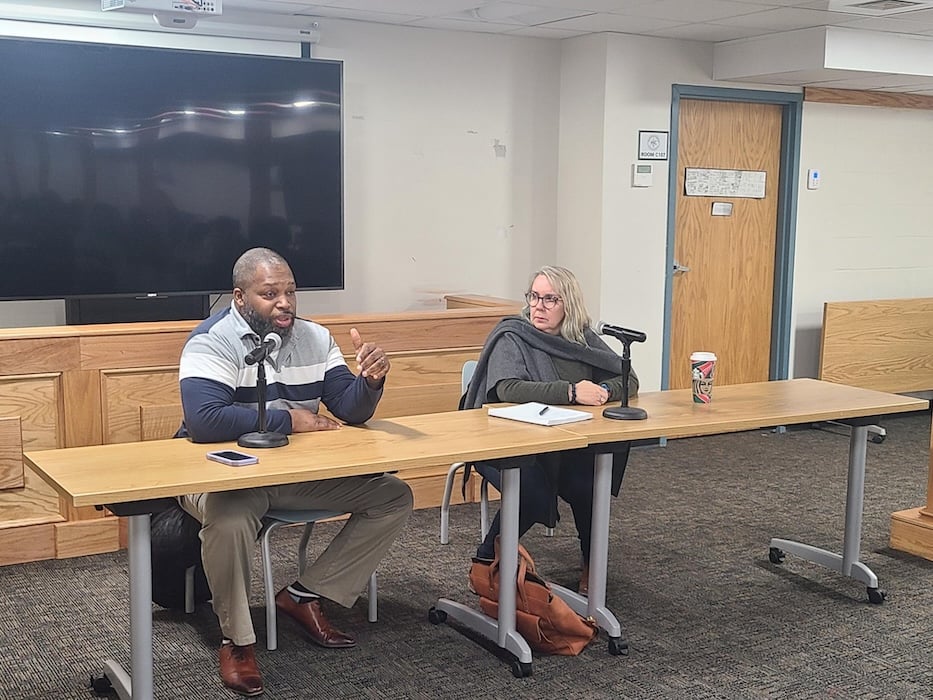
Cari Strand Photo.
Lobbyist Kate Robinson spent her teen years in New Haven. State Sen. Gary Winfield spent his in the Bronx before ultimately settling in the Elm City. Now the two have forged a lasting friendship and professional bond that helps move state government forward.
Last Friday, the two brought their wisdom and experience to 11th grade civics students currently attending Robinson's alma mater, High School in the Community.
Sharing a table, Robinson and Winfield told stories of their emerging leadership styles and inspired young people to take action to participate in local government. As they jumped from police accountability to food justice, students could see their common interest in holding people and systems of power accountable.
For both of them, that work started decades ago. In the 1980s, Robinson was a student at High School in the Community, then still a fledgling school that set the tone for experimental education in the city. After she graduated in 1989, she attended the University of Connecticut, majoring in theater. But well before that, she said, HSC got her out of her comfort zone in a million different ways
“When I came to High School in the Community, I felt accepted for the first time in a while,” she said. “HSC is a real slice of what New Haven looks like and lives like.”
As a lobbyist, it's Robinson's job to connect the experts in the community with the people making policy in state government, and to understand the legislative process so that her clients can communicate effectively with elected officials. When she talks about her work, she said, she wants people to know that not all lobbyists are bad actors: many want and will fight for what's best for the community, from community funding needs to policy decisions.
“The community knows what needs to happen and the policy makers know how to make it happen,” she said.
That work also brought her in touch with Winfield, who began his career as an activist in 1992, worked for years as a grassroots political organizer, and joined the Connecticut House of Representatives for the first time in 2009 after winning his first election in 2008. In 2013, he transitioned to the State Senate after Mayor Toni Harp was elected in New Haven, leaving a vacant position for a New Havener in the Connecticut General Assembly.
Like many of the students to whom he spoke, Winfield explained that he has gone through many obstacles. As a child, he was abused, and later harassed by police multiple times. His father wasn't very present in his life. While he is now a proud graduate of Southern Connecticut State University, he didn’t get to go to college directly from high school because of financial issues. But, he told students Friday, he kept going because he knew there was a light at the end of the tunnel.
As a state legislator, he said, his goal is to help people see that the challenges they go through make them who they are. Winding the clock back, he remembered meeting a man years ago, during his work as a grassroots organizer, at the Brotherhood Leadership Summit. The man had recently lost his cousin, and in his grief, said that he wanted revenge. Winfield urged him not to turn to violence.
After talking to him, Winfield realized that the work he was doing in the streets could translate to life-changing policy in the Connecticut State Legislature. As a freshman state representative, he made it part of his mission to abolish the death penalty, which the state ultimately did in 2012. Since, he has worked to stop solitary confinement, limit the use of deadly weapons by law enforcement, and hold town, city, and state police accountable through multiple proposed pieces of legislation.
In the summer of 2020, Winfield was the driving force behind a police accountability bill that received both bitter argument and favorable passage following the police killing of George Floyd in Minneapolis, Minn. Within its first year officially on the books, he told students, multiple police officers were let go from their jobs for behaving inappropriately. As he reflected on getting it over the finish line, he looked to it as one example of how a person's vision and drive can lead to systems change in the state.
Students (including this writer) left the class seeing the world differently. Courage Brown, a junior at HSC, pointed to the role that education and grassroots activism can play in one's future career.
"Today, I learned that people, especially here at HSC, have the opportunity to be out in the community and are given the utility to do what we want, to help out, to do anything that we dream of," Brown said. "There are people who were here before us and who are here with us now who want to make change with us and can be there with us to really do it."
In particular, many students of color felt like they were able to connect to the speakers. Many students at HSC now understand the importance of expanding their horizons and trying new things, even if it’s not in their immediate interest. The students at High School in the Community will forever be grateful that Robinson and Winfield came and spoke to them.
Sau'mora Short is a junior at High School in the Community.